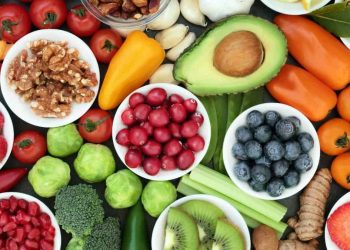Avocado Incredibly Nutritious Fruit You Must Include in Your Diet
The avocado is a rather unique type of fruit.
Most fruit consists primarily of carbohydrate, while avocado is high in healthy fats.
Numerous studies show that it has powerful beneficial effects on health.
Here are 12 health benefits of avocado, that are supported by scientific research.
1. Avocado is Incredibly Nutritious
What we refer to as “avocado” is the fruit of the avocado tree, called Persea americana
This fruit is prized for its high nutrient value and is added to all sorts of dishes due to its good flavor and rich texture. It is the main ingredient in guacamole.
These days, the avocado has become an incredibly popular food among health conscious individuals. It is often referred to as a superfood… which is not surprising given its health properties.
There are many kinds of avocados, and the shape (from pear-shaped to round) and color (from green to black) can vary between them. They can also weigh anywhere from 8 ounces (220 grams) to 3 pounds (1.4 kg).
The most popular type is called Hass avocado.
This is what a typical avocado looks like:
It is often called “alligator pear,” which is very descriptive because it tends to be shaped like a pear and have green, bumpy skin… like an alligator.
The yellow-green flesh inside the fruit is eaten, but the skin and seed are discarded.
Avocados are very nutritious and contain a wide variety of nutrients, including 20 different vitamins and minerals.
Here are some of the most abundant nutrients, in a single 3.5 ounce (100 gram) serving
- Vitamin K: 26% of the RDA.
- Folate: 20% of the RDA.
- Vitamin C: 17% of the RDA.
- Potassium: 14% of the RDA.
- Vitamin B5: 14% of the RDA.
- Vitamin B6: 13% of the RDA.
- Vitamin E: 10% of the RDA.
- Then it contains small amounts of Magnesium, Manganese, Copper, Iron, Zinc, Phosphorous, Vitamin A, B1 (Thiamine), B2 (Riboflavin) and B3 (Niacin).
This is coming with 160 calories, 2 grams of protein and 15 grams of healthy fats. Although it contains 9 grams of carbs, 7 of those are fiber so there are only 2 “net” carbs, making this a low-carb friendly plant food.
Avocados do not contain any cholesterol or sodium, and are low in saturated fat. I personally don’t think that matters, but this is one of the reasons they are favored by many “old school” experts who still believe these things are inherently harmful.
Bottom Line: Avocado is a green, pear-shaped fruit often called an “alligator pear.” It is loaded with healthy fats, fiber and various important nutrients.
2. They Contain More Potassium Than Bananas
Potassium is a nutrient that most people aren’t getting enough of.
This nutrient helps maintain electrical gradients in the body’s cells and serves various important functions.
Avocados are actually very high in potassium… with a 100 gram (3.5 ounce) serving containing 14% of the RDA, compared to 10% in bananas, which are a typical high potassium food.
Several studies show that having a high potassium intake is linked to reduced blood pressure, a major risk factor for heart attacks, strokes and kidney failure.
Bottom Line: Potassium is an important mineral that most people don’t get enough of. Avocados are very high in potassium, which should support healthy blood pressure levels.
3. Avocado is Loaded With Heart-Healthy Monounsaturated Fatty Acids
Again, avocado is a high fat food.
In fact, 77% of the calories in it are from fat, making it one of the fattiest plant foods in existence.
But they don’t just contain any fat… the majority of the fat in avocado is oleic acid.
This is a monounsaturated fatty acid that is also the major component in olive oil and believed to be responsible for some of its beneficial effects.
Oleic acid has been linked to reduced inflammation and been shown to have beneficial effects on genes linked to cancer .
The fats in avocado are also pretty resistant to heat-induced oxidation, making avocado oil a healthy and safe choice for cooking.
Bottom Line: Avocados and avocado oil are high in monounsaturated oleic acid, a “heart healthy” fatty acid that is believed to be one of the main reasons for the health benefits of olive oil.
4. Avocados Are Loaded With Fiber
Fiber is another nutrient found in relatively large amounts in avocado.
Fiber is indigestible plant matter that can contribute to weight loss, reduce blood sugar spikes and is strongly linked to a lower risk of many diseases
A distinction is often made between soluble and insoluble fiber.
Soluble fiber is known to be able to feed the friendly gut bacteria in the intestine, which are very important for the optimal function of our bodies
A 100 gram (3.5 ounce) serving of avocado contains 7 grams of fiber, which is 27% of the recommended daily amount.
About 25% of the fiber in avocado is soluble, while 75% is insoluble.
Bottom Line: Avocados tend to be high in fiber, about 7% by weight, which is very high compared to most other foods. Fiber can have various important benefits for weight loss and metabolic health.
5. Eating Avocados Can Lower Cholesterol and Triglyceride Levels
Heart disease is the most common cause of death in the world (16).
It is known that several blood markers are linked to an increased risk.
This includes cholesterol, triglycerides, inflammatory markers, blood pressure and various others.
The effects of avocado on some of these risk factors has been studied in 8 human controlled trials.
These are studies where people are split into groups… one group is instructed to eat avocados, while the other is not. Then researchers see what happens to their blood markers over time.
Not only are avocados healthy, they’re also incredibly delicious and go with all sorts of foods.
You can add them to salads and various sorts of recipes, or you can simply scoop them out with a spoon and eat them plain.
They have a creamy, rich, fatty texture and blend well with various other ingredients.
A notable mention is guacamole, which is arguably the most famous use of avocados. It includes avocado along with ingredients like salt, garlic, lime and a few others depending on the recipe.
An avocado often takes some time to ripen and it should feel slightly soft when ripe. The nutrients in avocado can oxidize soon after fleshing it, but if you add lemon juice then that shouldn’t happen as quickly.
At the end of the day, avocados are an awesome food. They’re loaded with nutrients, many of which are lacking in the modern diet.
They are weight loss friendly, heart healthy and… last but not least, taste incredible.
What more could you ask for in a food?










